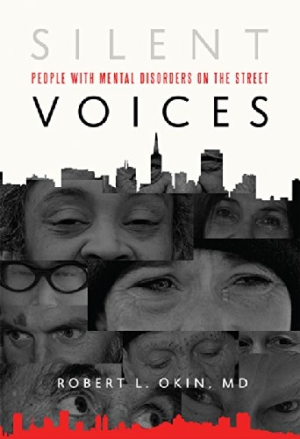Silent Voices
People with Mental Disorders on the Street
This intense collection of photos and quotations from homeless people reveals an inside look at how policies and society can affect the vulnerable.
When you see a homeless person on the street, what do you do? Some of us walk on by, some offer money or food, but few make eye contact, and fewer still take the time for a conversation. What would we learn if we did? Dr. Robert L. Okin knows, because he stopped to talk with, befriend, and photograph dozens of homeless people in an effort to get their real stories. In Silent Voices: People with Mental Disorders on the Street, the longtime psychiatrist presents emotionally powerful portraits of some of our nation’s homeless in words and images, intimate stories that call on us all to stop, look, and listen.
For two years, San Francisco General Hospital’s chief of psychiatry spent his days on the streets with people whom facilities like his couldn’t reach. Respectful and compassionate, Okin was careful to ask permission to photograph his new acquaintances and to write down their stories. He expected many people to refuse his overtures, but instead, he found that most were willing, even eager, to share.
Okin’s photographs fill more than half of the pages in the book and could easily stand alone. He zooms in on emotion: the tearful face of a mother who hasn’t seen her son in over ten years, the shaky hand of a champion chess player whose words seem to make no sense, and the absent stare of a woman who lives life from within a blue sleeping bag she carries everywhere. The generous space given to the photographs truly makes it impossible to look away.
To this collection of intense images, Okin adds quotations, from the homeless themselves, that serve to delve more deeply into their world. Although Okin does resort to paraphrasing the tales of people whose disorders make them particularly disorganized speakers, he mostly relies on people to tell their own stories. Out of two years’ worth of conversations, Okin has skillfully selected poignant and illustrative quotations. When sharing the words of a man who would rather brave the streets than the unsanitary, unsafe conditions in the only available shelter, for instance, he reveals what it’s like to have so few options.
Okin bookends the stories with informed commentary on the history of homelessness and the mentally ill, things like the deinstitutionalization movement and changes in involuntary-commitment laws that have contributed to the problem. Silent Voices belongs not only on every social worker’s desk, but also in the hands of every politician considering policies that affect the downtrodden among us.
Reviewed by
Sheila M. Trask
Disclosure: This article is not an endorsement, but a review. The publisher of this book provided free copies of the book to have their book reviewed by a professional reviewer. No fee was paid by the publisher for this review. Foreword Reviews only recommends books that we love. Foreword Magazine, Inc. is disclosing this in accordance with the Federal Trade Commission’s 16 CFR, Part 255.

